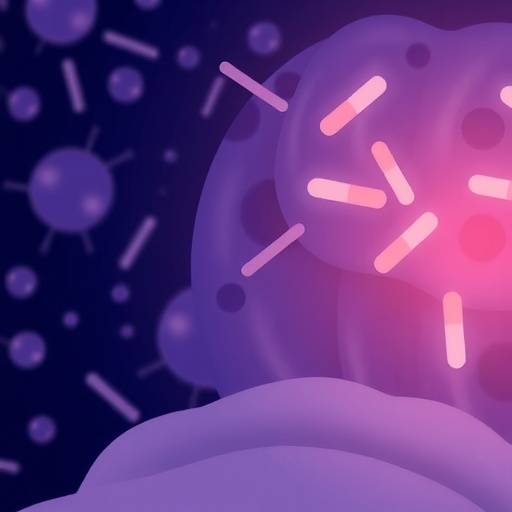In a groundbreaking investigation published in BMC Psychiatry, researchers delve into the intricate relationship between insomnia symptoms and various clinical, metabolic, and immunological factors in individuals suffering from chronic schizophrenia. This study unearths compelling evidence that not only underscores the high prevalence of insomnia in this population but also points to specific biological markers that may pave the way for early diagnosis and targeted intervention strategies.
Insomnia, a pervasive sleep disorder characterized by difficulties in initiating and maintaining sleep, is often overlooked in chronic psychiatric conditions despite its substantial impact on patient outcomes. Particularly in chronic schizophrenia, where cognitive deficits and psychiatric symptoms already burden patients, the addition of insomnia can exponentially worsen overall functioning and exacerbate suicidal risk. Understanding the underpinnings of insomnia within this group is therefore critical.
Drawing from a sample of 317 patients diagnosed with chronic schizophrenia between May and December 2018, the researchers employed a multi-dimensional assessment framework. This included collecting standardized demographic data, psychiatric evaluation metrics, as well as biochemical measurements of lipid metabolism and inflammatory cytokines. The research aimed to unravel potential biological and clinical correlates that might predict insomnia symptoms in this vulnerable cohort.
Statistical analysis revealed that 42.3% of patients exhibited prominent insomnia symptoms, reaffirming insomnia as a significant comorbidity in chronic schizophrenia. These individuals were notably older and manifested amplified scores in positive psychotic symptoms, general psychopathology, and depressive states, as gauged by validated rating scales including the Calgary Depression Scale for Schizophrenia (CDSS).
A pivotal finding concerns the role of systemic inflammation in the pathophysiology of insomnia within schizophrenia. Elevated plasma levels of interleukin-6 (IL-6), a key pro-inflammatory cytokine, were consistently associated with the presence of insomnia symptoms. This aligns with an emerging body of literature implicating immune dysregulation and chronic inflammatory states in sleep disturbances and neuropsychiatric disorders alike.
Through logistic regression modeling, the study identified three independent predictors of insomnia symptoms: advancing age, increasing total scores on the CDSS, and elevated log-transformed IL-6 levels. These factors collectively emphasize a multifactorial etiology where psychological, biological, and age-related changes intersect, influencing sleep quality in schizophrenia patients.
Notably, although lipid metabolism parameters were assessed, the findings predominantly highlight inflammatory markers over metabolic variables in explaining insomnia symptoms. This nuanced understanding suggests inflammatory pathways might serve as more reliable biomarkers and potential therapeutic targets than metabolic factors in this specific psychiatric context.
The implications of this research are profound for clinical practice. Routine assessment and monitoring of sleep quality should become integral components of the management plan for chronic schizophrenia patients. Early identification of those at risk for insomnia could facilitate timely interventions, potentially improving psychiatric symptoms, cognitive function, and reducing suicide risk.
Moreover, the identification of IL-6 as an independent correlate invites exploration into anti-inflammatory treatments or lifestyle interventions aiming to modulate systemic inflammation. This biological approach represents a paradigm shift from symptom-targeted therapies towards addressing underlying pathophysiological mechanisms contributing to insomnia.
Future research should endeavor to explore causal relationships and longitudinal trajectories of sleep disturbance alongside inflammatory changes. Additionally, expanding biomarker panels to include other cytokines and exploring their interactions could deepen our understanding of immune-sleep dynamics in schizophrenia.
In sum, the study by Liu et al. offers a comprehensive and methodologically rigorous exploration into the interface of insomnia and chronic schizophrenia, highlighting significant clinical and biological markers. These insights pave the way for enhanced diagnostic acumen and innovative interventional approaches, ultimately aiming to alleviate the compounded burden of insomnia in this high-risk population.
This pioneering work not only advances psychiatric research but also resonates with broader neuroscientific efforts to decode the complex mechanisms linking mental health, sleep, and immune function. As clinicians and researchers continue to grapple with the multifaceted challenges of schizophrenia, integrating these findings promises to elevate patient care and clinical outcomes substantially.
Subject of Research:
Associations between insomnia symptoms and clinical features, lipid metabolism parameters, and inflammatory cytokines in patients with chronic schizophrenia.
Article Title:
The associations between insomnia symptoms and clinical features, lipid metabolism parameters, as well as inflammatory cytokines in patients with chronic schizophrenia
Article References:
Liu, L., Li, Z., Wang, J. et al. The associations between insomnia symptoms and clinical features, lipid metabolism parameters, as well as inflammatory cytokines in patients with chronic schizophrenia. BMC Psychiatry 25, 830 (2025). https://doi.org/10.1186/s12888-025-07293-2
Image Credits:
AI Generated




